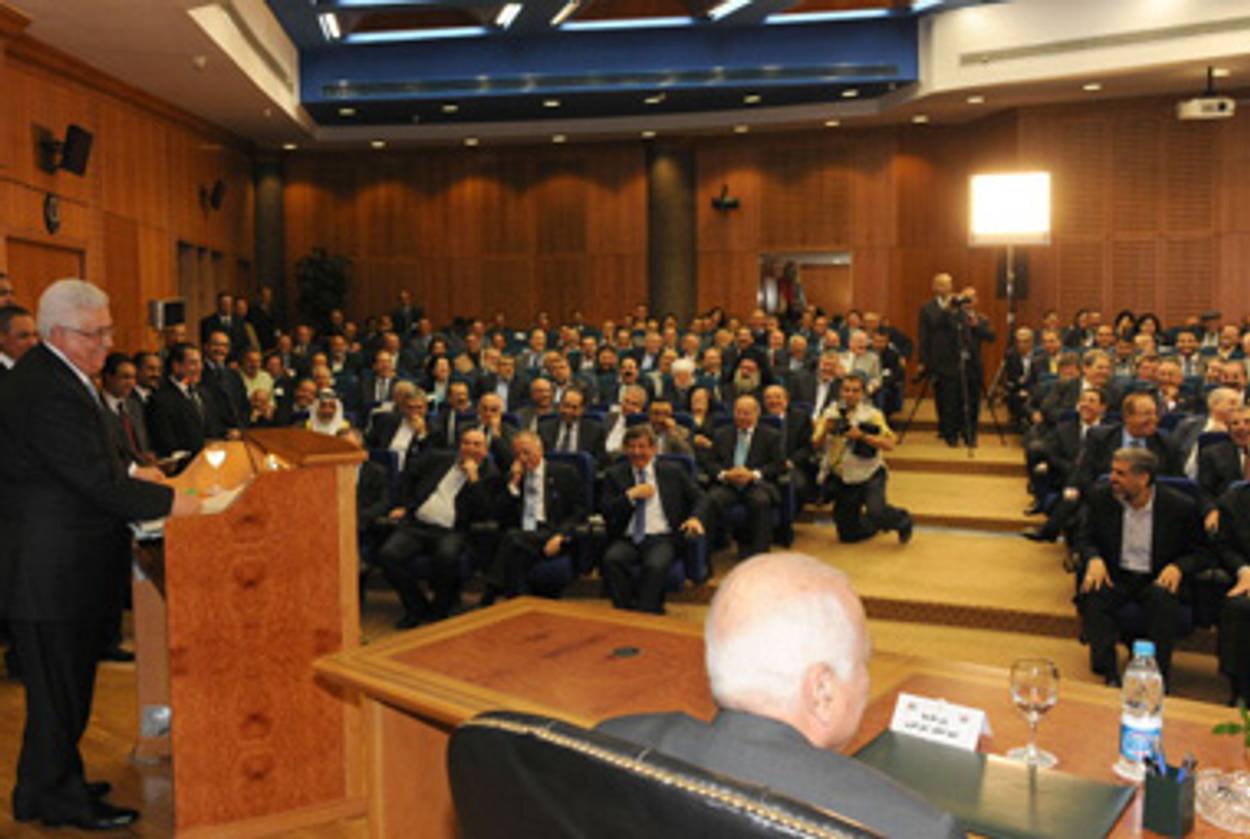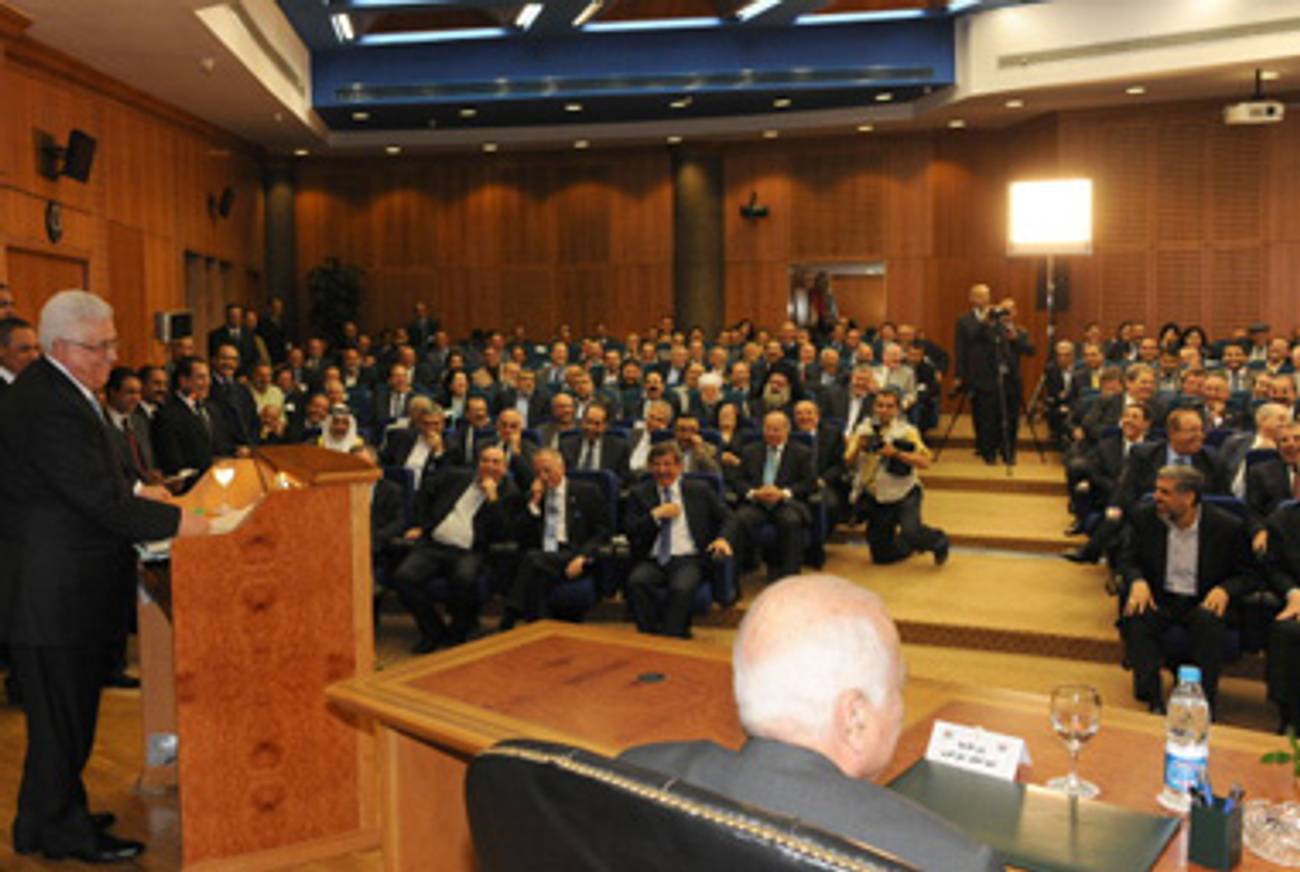How Long Will This Marriage Last?
The myriad problems with and underlying logic for reconciliation




Yesterday, in Cairo, Palestinian Authority President Mahmoud Abbas (of Fatah) and Damascus-based Hamas leader Khaled Meshaal signed a pact that committed the two groups to a unity government, with an independent prime minister (Abbas remains president), and elections within a year. They are going to start implementing the pact next week. “We will have one authority and one decision,” Meshal said. “We need to achieve the common goal: a Palestinian state with full sovereignty on the 1967 borders with Jerusalem as the capital, no settlers, and we will not give up the right of return.”
That would be a problematic statement even if it were true, since the 2008 talks between Abbas and then-Prime Minister Ehud Olmert—much-cited as laying something very close to the groundwork for a workable deal—would, after all, have kept nearly all of Jerusalem in Israel, made land-swaps based on the ’67 borders that nonetheless altered them, and, most importantly, resolved the right-of-return issue at a relatively small price to Israel. However, Meshaal’s statement was actually about the most conciliatory (to Israel) thing to come from Hamas in recent days. “Our common enemy is Israel,” also Meshaal said at the ceremony. “Israel must be fought through force and diplomacy.” Ismail Haniyeh, who is Hamas’s leader in the actual Gaza Strip, has asked the Fatah-controlled Palestine Liberation Organization—technically, the group that negotiates with Israel—to rescind its recognition of Israel. Haniyeh also of course condemned the killing of Osama Bin Laden this week. Mere hours before the signing, Hamas executed someone for allegedly collaborating with Israel in obvious defiance of the rule that executions receive presidential (e.g., Abbas’s) approval. And P.A. Prime Minister Salam Fayyad? The man whose West Bank state-building was the cause of so many plaudits from Western observers and so much legitimacy in the international eye? Don’t look for him to be involved in the unity government.
It bears repeating, because, as Jerusalem Post’s David Horovitz eloquently bemoaned, too many (ahem) appear to have forgotten it: Hamas is an Iran-funded group ideologically and religiously dedicated—on a rhetorical level, indisputably; and on every other level, pretty clearly—not to peace with Israel but to its replacement and even destruction.
That doesn’t mean Israel should pretend this deal hasn’t happened. It doesn’t mean there isn’t at least the chance that the deal could have the effect of pulling Hamas toward a more moderate position, although it seems to me more likely that it will have the effect of pulling Fatah to a more radical place. And it certainly doesn’t mean Israel can’t use creative diplomacy to convey to the world that, to paraphrase Prime Minister Netanyahu, Fatah chose peace with Hamas over peace with Israel. And maybe, as contributing editor Nathan Thrall suggests in today’s Times, the Palestinians’ diplomatic reset could also occasion an Israeli one?
Anyway, Shlomo Brom does an excellent job explaining how Israel and the United States could simply force Hamas to go along with the continued track of the peace process if it turns out Hamas is acting primarily out of weakness; the problem being that, with its parent organization the Muslim Brotherhood newly resurgent in Egypt, that is likely not the case. Either way, you could argue, as Aaron David Miller does, that the deal represents a boon to Bibi and the rest of the Israeli right, who now have clearer proof than ever that the other side is fundamentally illegitimate.
Anyway, at the very least it is worth taking a deep breath and seeing just how long the deal lasts. Signs are that there is trouble in paradise: Abbas and Meshaal never actually shared the podium at yesterday’s signing ceremony and in fact bickered beforehand; the outgoing Shin Bet head argued that true reconciliation in the next couple of years is quite unlikely; and even many Palestinians in the territories are skeptical.
However, with the collapse of Hamas’s main base in Damascus; a new, much more Islamist-friendly Egyptian regime on Gaza’s border; Abbas’s continued crisis of legitimacy; and, yes, the stagnant peace process—or just the general remote chances for peace, if you prefer—for which a fair-minded person would have to place a good deal of blame on Israel; the logic for some sort of unity, at least until September’s U.N. General Assembly rolls around, feels pretty strong.
Palestinian Factions Sign Pact to End Rift [NYT]
Hamas and Fatah Plan to Begin Implementing Unity Pact Next Week [Haaretz]
Hamas to PLO: Rescind Recognition of Israel [Ynet]
Popular Palestinian Premier Could Be on Way Out [The Statesman]
Where Is The Outrage? [JI Daily/JPost]
‘Abbas and Meshaal Fought Over Speech’ [Ynet]
Hurting Moderates, Helping Militants [NYT]
West Bank and Gaza Allow Themselves Only a Measure of Hope [NYT]
The Fatah-Hamas Reconciliation Agreement [INSS Insight]
Circus of the Dancing Bears [FP]
Earlier: Diplomats’ Report: Deal Could Prove Useful
Hamas Mourns OBL, Throwing Deal into Doubt
Marc Tracy is a staff writer at The New Republic, and was previously a staff writer at Tablet. He tweets @marcatracy.